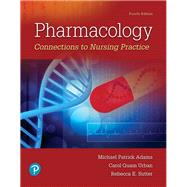For courses in pharmacology.
A patient-centered approach to pharmacology in nursing practice
Pharmacology: Connections to Nursing Practice links pharmacology to nursing practice and patient care. Features illuminate connections between pharmacology and nursing practice, from patient scenarios and practice applications, to lifespan considerations, alternative therapies, and gender and cultural influences. The use of prototype drugs helps nurses learn a vast range of medications, while organization by body systems and diseases places drugs in the context of their therapeutic applications. The 4th edition includes more than 30 new FDA-approved drugs, more than 20 new visuals clarifying concepts, and a new feature developing the clinical decision-making skills of advanced practice nurses.








